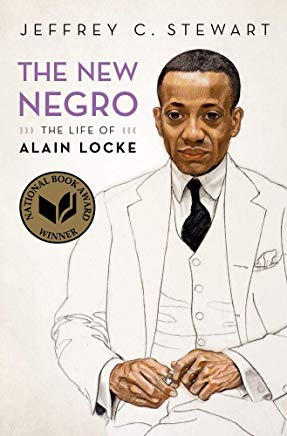This week, I decided to post a review of the biography on Alain Locke, a key figure in starting the Harlem Renaissance.
I have long been fascinated by the figure of Alain Locke – who I knew as the first African American Rhodes Scholar (in 1907), the philosopher that the civil rights leader Martin Luther King spoke about, the influential Howard University professor (the historically black university located in Washington D.C.), and perhaps most importantly (to me) as the philosophic architect of the Harlem Renaissance. Locke was known for the fact that he championed such writers as Zora Neale Hurston.
That I had heard he was gay only made him more interesting. Then I learned that the long-awaited biography of Locke was coming out written by Jeffrey C. Stewart titled, The New Negro, The Life of Alain Locke had been published in 2018. It was published by Oxford University Press and received the 2018 National Book Award for nonfiction.
Then the book arrived. I have to admit that I was daunted by its 800 pages – 878 to be exact. Also, like many people, if not most, I rarely read biographies. But once I started reading this one, I found it so fascinating that I could barely put it down – even though it is physically hard to pick up because it is so heavy. So, even if you rarely read biographies, I would suggest reading this one. It’s a real page turner and you’ll learn a lot of important historical information.
Locke – as Stewart writes – was “a tiny effeminate gay man – a dandy, really, often seen walking with a cane, discreet, of course, but with just enough hint of a swagger, to announce to those curious that he was queer, in more ways than one, but especially in that one way that disturbed even those who supported Negro liberation. His sexual orientation made him unwelcome in some communities and feared in others as a kind of pariah.”
Some of the intriguing things that I learned was that Locke was very close to his mother, in fact after her death in 1922, left him bereft, and after a stint in travelling in Europe where he could be more sexually open, and after being fired for a time by Howard University for being too vocal on race relations (although he was later hired back), he poured himself into their shared love for art and commenced on starting the Harlem Renaissance, with the idea that there was liberation in art that was African American identified.
The Harlem Renaissance loomed so large in my mind that even though I already knew that it was basically over by 1929, when the American stock market collapsed, it was rather depressing to read about it again. Harlem, long the African American section of New York City, was hit very hard by the Great Depression. The Harlem Renaissance, however, remains an important part of history – and many African American identified visual artists and writers were influenced and inspired by it long after the 1920s, as Stewart writes.
Some of the things that I learned that intrigued me was that Locke was very close to his mother and that after her death, he replicated his relationship with her to some extent with several older women who were important to him. I also found it fascinating that the campus of University of Oxford (where Locke found himself after he won the prestigious Rhodes Scholarship), was a hotbed of gay male activity – and that this was the same university that the gay legend Oscar Wilde was graduated from in 1878, three decades before Locke arrived. I also learned that Locke faced less racism in Europe. However, some of the major racist obstacles that Locke faced at Oxford were created by other American Rhodes Scholars.
Most of what I learned was that Locke, a black, gay man, faced major obstacles in his life because of racism and homophobia. Despite these obstacles he thrived, and he changed the course of history.
His life is inspiring.
Note: This piece originally aired on This Way Out (TWO), the internationally syndicated LGBT radio show.
For more information on my most recent novel Loving Artemis, an endearing tale of revolution, love, and marriage, click here:
Read Full Post »



